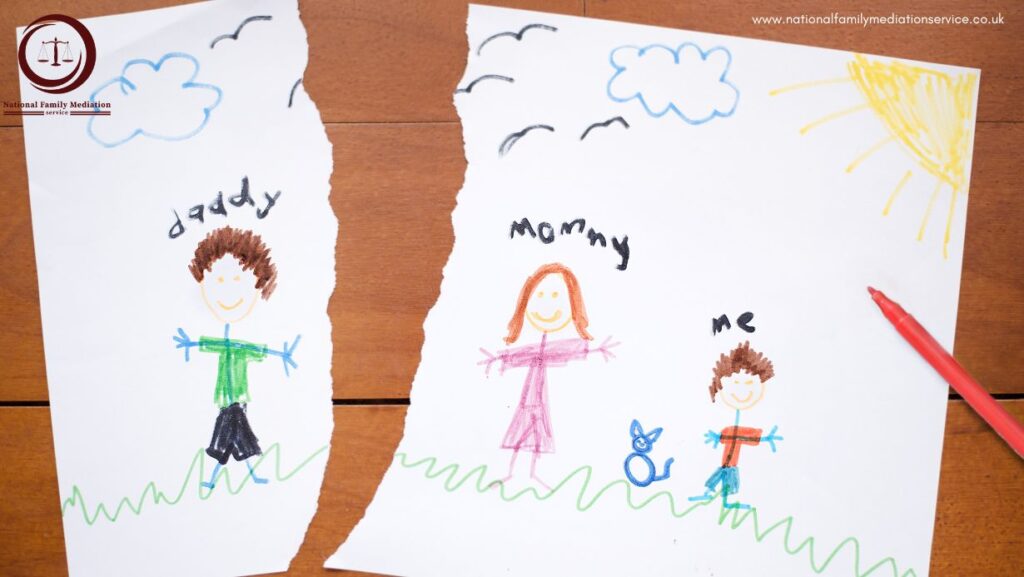Can mediation Help Resolve Disagreements over visitation? Disagreements about visitation schedules can be hard and emotionally tough for families, especially when children are involved. The family court is there to help solve these issues, but many families are choosing family mediation. The mediation process encourages open communication. A neutral third party helps parents come to visitation schedules that are good for their children and focus on their best interests.

In family law, visitation disputes can come up during separation or divorce where its important to focus on the needs and well-being of the children instead of fighting in a legal setting.
A key idea with National Family Mediation is focusing on the “child’s best interests.” This principle is very important in family law and guides the mediation process. The mediator helps parents focus on what is best for their child. This includes making sure the child has stability, emotional health, and a strong bond with both parents. They work together to create a visitation plan that meets these needs.
Why Choose Mediation Can mediation Help Resolve Disagreements for Schedule Conflicts?
When asking can mediation help resolve disagreements when conflicts come up, using mediation to solve them has many benefits. First, it helps parents talk openly, with support from a neutral third party, the mediator. This setup makes it easier to have calm and respectful talks, which is important, especially when feelings are strong.
Second, National Family Mediation offers flexible and creative ways to find solutions. Instead of having a judge make a decision, mediation lets parents design a visitation schedule that fits their needs. This can lead to better satisfaction and teamwork over time.
Most importantly, mediation keeps the focus on what’s best for the child. It promotes working together, so parents can think about their child’s well-being, instead of their disagreements. This leads to solutions that really benefit the child.
The Process of Mediation for Visitation Conflicts – Can mediation Help Resolve Disagreements
The mediation process usually includes several sessions. The number of sessions will depend on how complex the issues are and how open the parties are to communicate and negotiate. Each session allows parents to share their concerns, look at options, and try to find solutions that work for both sides.
Pre-Mediation Considerations – Can mediation Help Resolve Disagreements
Before starting the mediation sessions, parents can do a few things to prepare for a better experience. First, have an initial assessment meeting with the mediator. This will give you an idea of the mediation process and help you set realistic expectations. Take this chance to ask questions and learn about the mediator’s role.
Next, gather important information about visitation schedules. This includes school schedules, childcare plans, and any related legal or medical documents. Having this information can make discussions easier and ensure everyone is on the same page.
It’s normal to have mixed feelings, but being open and willing to talk can greatly affect the outcome. Think about the compromises you can make. Focus on finding solutions that are in the best interests of your child.

Can mediation Help Resolve Disagreements? Successful mediation depends on a clear process that helps people talk effectively. The trained mediator sets communication rules so everyone can share their thoughts respectfully. This way, they can avoid blaming each other or making personal attacks. It is important to create a safe space for open conversations, especially for sensitive topics.
In the end, focusing on the child’s best interests is the most important part of these discussions. The mediator will help parents think about the child’s viewpoint, growth needs, and the value of strong bonds with both parents. This approach keeps the child’s well-being as the top priority when making agreements.
Focusing on the Child’s Best Interests – Can mediation Help Resolve Disagreements
This could mean looking at the child’s age, how they are growing, their bond with each parent, and any special needs they might have. It also means making a parenting plan that gives the child a stable and consistent life, cutting down on confusion and keeping a loving and supportive environment.
In family disputes about who gets to take care of the child and when they visit, the most important thing is always the “best interests of the child.” This rule is more important than any personal fights between parents. The National Family Mediator helps parents understand and use this rule for their situation.
When parents focus on the child’s needs, they can set up a visit plan that helps the child’s well-being. It can help nurture strong and healthy bonds with both parents, even after they separate or get a divorce.
Can mediation Help Resolve Disagreements – Overcoming Common Challenges in Mediation
Navigating mediation can be helpful, but it also comes with challenges. When dealing with people who have strong emotions or conflicts, patience and understanding are key. It is important to keep personal feelings separate from the issues being discussed. The mediator plays an important role in keeping everyone focused on having good conversations and helping them communicate better.
Another challenge is the mix of legal and emotional issues that often appear in family disputes. Not understanding legal rights or the emotional impact of choices can cause problems. Getting legal advice during the process can help individuals understand their options. Additionally, seeking support from a therapist can empower people to make better decisions while facing emotional challenges.
Can mediation Help Resolve Disagreements – Navigating Emotional and Legal Complexities
National Family Mediation offers important solutions for solving issues with visitation schedules. It offers a helpful way to deal with conflicts that focuses on the child. Choosing mediation helps families work through problems, keep the child’s best interests in mind, and encourage open communication. Picking a qualified mediator and knowing the steps before mediation is vital for success. Mediation can help address common issues like strong emotions and difficult personalities, leading to friendly agreements. It gives families a flexible way to find lasting solutions and support positive co-parenting relationships.

Is mediation for visitation conflicts legally binding in the UK?
Can mediation Help Resolve Disagreements? Agreements made in family mediation are not legally binding right away. However, these agreements can be made official through a consent order by the court. Once this happens, they can be enforced under family law.
National Family Mediation plays a significant role in resolving family conflicts, including child access arrangements, financial matters, and property disputes. It provides a structured process to help parents reach agreements outside of court battles, keeping decision-making in their hands rather than in the hands of a judge.
Can mediation Help Resolve Disagreements with Child Access Arrangements?
National Family Mediation is a valuable tool that helps parents create workable child arrangements by focusing on the interests of all parties, particularly the children. It reduces the adversarial nature of court proceedings and promotes cooperation, ensuring a child-centred approach.
What Factors Are Considered When Creating a Parenting Plan in Mediation?
A parenting plan considers various financial matters, living arrangements, schooling, and the child’s emotional well-being. The complexity of the dispute can affect the length of mediation, but the process aims to create a stable and fair arrangement that works for both parents.
Can Mediation Help Resolve Disagreements Over Visitation Schedules?
Using National Family Mediation Service offers a valuable alternative to court cases, providing a space for parents to discuss and negotiate visitation schedules in a collaborative manner. Mediation can help identify underlying issues, improve communication, and find creative solutions that meet the needs of both parents and children. By fostering understanding and compromise, mediation can indeed be instrumental in resolving disagreements over visitation schedules effectively.A mediator facilitates discussions to ensure a fair and flexible plan that suits the child’s needs while considering parental availability.
Can mediation Help Resolve Disagreements Around Co-Parenting Disputes
The National Family Mediation process helps bridge gaps in parenting styles by encouraging mutual respect and understanding. It fosters cooperation, ensuring that differences do not escalate into court battles.
Can mediation Help Resolve Disagreements for Child Support Disputes?
Yes, National Family Mediation can address financial disputes such as child support, often forming part of broader financial agreements. It helps parents reach financial settlements without going to court, making it a valuable tool for resolving financial matters.
Before starting mediation, a mediation information assessment meeting (MIAM) is often required as the first step. This helps assess the complexity of the issues and whether mediation is the right path. A successful agreement can be documented in a memorandum of understanding, outlining the terms agreed upon by both parents.
Can Mediation Help Resolve Disagreements – Conclusion
By avoiding the nature of court proceedings, National Family Mediation helps maintain positive relationships among family members and leads to cost-effective, quicker resolutions compared to traditional court cases.
Speak to National Family Mediation to speak to our experts today or complete our contact form here to arrange a callback.
